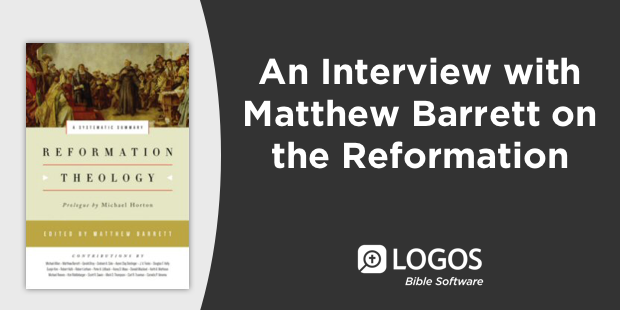
Logos Interview: Reformation Theology
Matthew Barrett, the general editor of Reformation Theology: A Systematic Summary (Crossway), was recently interviewed by Daniel Motley of Logos Bible Software. Part 1 of this interview is available on Logos Talk. Part 2 of this interview is available on the more academic arm of Logos, The Lab.
Here is an excerpt from Part 1:
In October, we’ll be celebrating the 500 year anniversary of the Reformation. What did the Reformers believe was at stake in their efforts to reform the church of their day?
When Luther was excommunicated by Rome, we need to remember what was at stake: Luther’s eyes were opened to the biblical gospel. By pounding on the apostle Paul, especially his letter to the Romans, Luther realized that a sinner is justified in God’s sight by grace alone (sola gratia) through faith alone (sola fide) in Christ Jesus alone (solus Christus), all of which Rome denied. Justification, said Luther, is not a process by which one is made righteous (that’s sanctification); instead, justification is God’s instantaneous declaration that the ungodly, upon faith in Jesus, are no longer “guilty” but “righteous.” This new righteous status, however, does not come from within the sinner, but instead is credited or imputed to the sinner’s behalf. It is none other than the righteousness of Christ.
Did the issue of authority also play into the Reformers’s clash with Rome?
Yes, Rome not only grew hostile to Luther’s teaching on justification but she reacted strongly against his understanding of authority as well. As debates over purgatory, indulgences, penance, and the nature of divine grace continued to evolve from 1517-1521, the question was naturally raised: “Who or what has final authority to decide on these matters?” Though Rome had a high view of scripture’s inspiration, nevertheless, Rome believed tradition was also a source of revelation and could be an infallible authority equal to or greater than Scripture itself. The Christian’s authority was Scripture and tradition; or more accurately, Scripture as interpreted by tradition. Luther, on the other hand, argued that as important as church councils, church fathers, and popes may be as authorities and guides for biblical interpretation, they are not the final authorities for the church and for the Christian. Only Scripture is God-breathed and therefore only Scripture is the inerrant, sufficient, and final authority for church and practice. While popes and councils err, Scripture does not. This belief—sola scriptura—created a firestorm as Luther came into conflict with Roman theologians who argued that the pope, for example, was infallible, even above Scripture, which was unclear and insufficient.
Are these two issues—faith alone and Scripture alone—still relevant today? Or should we abandon the Reformation project?
These two beliefs—sola fide and sola scriptura—also referred to as the material and formal principles of the Reformation, were at the core of the 16th century debate. The Reformation, in other words, was first and foremost a reform in doctrine. The Reformers believed Rome’s teaching was inherently unbiblical. Therefore, they argued, the church was in desperate need to return to the teachings of the word of God.
Should we abandon this call to doctrinal reform today? Only if you think we should abandon the gospel itself! But last I checked, the church in the twenty-first century still struggles with a biblical understanding of the gospel, a right view of its application in conversion, as well as a proper assessment of biblical authority in the life of the church.
Here is an excerpt from Part 2:
What consequences did Luther’s new understanding of justification have for the Christian life?
Naturally, Luther’s view of Christian assurance changed entirely. If it is an alien righteousness that we receive by grace alone through faith alone, then our confidence of heaven rests not upon our own merit but upon the merit of Christ alone. The “afflicted conscience,” Luther advised, “has no remedy against despair and eternal death except to take hold of the promise of grace offered in Christ, that is, this righteousness of faith, this passive or Christian righteousness.”
Rather than trusting in one’s own righteousness through the Law (what Luther labelled “active righteousness”), one should instead look to “passive righteousness,” that is, the righteousness of Jesus. “Thus I put myself beyond all active righteousness, all righteousness of my own or of the divine Law, and I embrace only that passive righteousness which is the righteousness of grace, mercy, and the forgiveness of sins.” The righteousness of Christ, says Luther, is not a righteousness we “perform but receive,” it is not one we “have but accept, when God the Father grants it to us through Jesus Christ.”[5]
What a load, what a burden, was lifted off of Luther’s shoulders when he came to see this for the first time!
Read this entire interview on Logos Talk and The Lab.
